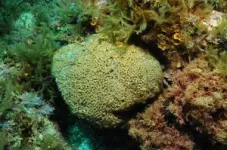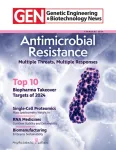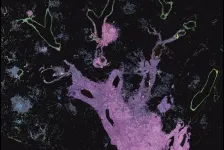Under embargo until Friday 9 February, 00:01 UK time
Industrial pollution leaves its mark in Mediterranean corals
For the first time, pollutants from burning fossil fuels have been found embedded in corals, offering scientists a potential new tool to track the history of pollution, finds a new study led by UCL researchers.
The study, published in the journal Science of the Total Environment, identified carbon particles emitted by burning fossil fuels embedded in the corals of Illa Grossa Bay, off the Columbretes Islands in the Mediterranean Sea. Finding this type of pollution – known as fly-ash or spheroidal carbonaceous particles (SCPs) – contaminating natural deposits is seen as an indicator of the presence of human influence on the environment, and an historical marker of the beginning of the proposed Anthropocene epoch.
Corals are a commonly used natural archive for paleoclimate studies because of their measurable growth rates. Akin to tree rings, their long life and slow and regular growth can provide scientists with annual, monthly or even weekly, environmental data going back years. Up to now, they’ve largely been used to gauge past climatic conditions like water temperatures and chemistries, but this is the first time that pollutant particles – other than microplastics – have been recovered from corals.
Lead author, Dr Lucy Roberts (UCL Geography), said: “The discovery of these pollutants embedded in coral skeletons extend over decades and paint a clear picture of how extensive human influence is on the environment. It’s the first time we’ve been able to see this kind of contaminant in corals, and its appearance in these deposits parallel the historic rate of fossil fuel combustion in the region.”
Corals, which are small invertebrates that tend to dwell in expansive colonies, ingest the SCP pollutants from the surrounding waters, incorporating them as they grow their calcium carbonate skeletons.
Researchers at Instituto de Acuicultura de Torre de la Sal (IATS-CSIC) collected coral samples from several sites along a reef off the coast of Castelló, Spain. The coral species, Cladocora caespitosa, has been studied and monitored there for two decades and the location is considered a global change sentinel site. The corals are located nearly 60 kilometres away from shore, and within a protected marine reserve, minimising the likelihood of local contamination. The species is the only Mediterranean coral with the capacity to form large reefs, and are known to grow at an average of about 0.3 centimetres per year.
Once in the lab at UCL, the corals were dissolved in acid, leaving behind any pollutant particulates embedded in the skeleton. The team first counted all SCPs in the remains under a microscope. The samples were then viewed under an electron microscope and analysed with x-rays to look for the chemical signatures of SCP contamination indicative of coal or oil power plants.
The team found the corals showed a significant increase in SCP contamination between about 1969 and 1992. This corresponds to a time when Europe was industrialising quickly, and coal consumption in the country increased dramatically.
These results align with other measurements of SCP contamination taken from mountain lakes in Spain, which supports the idea that corals can serve as natural archives to gauge changing levels of pollution over the years.
These findings come at a time when scientists are looking for tools to mark the beginning of the Anthropocene epoch, a unit of geological time, used to describe the most recent age in Earth’s history where human activity became the dominant influence on the planet’s climate and environment.
A number of scientists have advocated using the presence of SCPs as marker for the beginning of the Anthropocene, and their discovery in coral skeletons lend support to this argument. Already they’ve been identified in lake and marine sediments, ice cores, and peat beds.
Dr Roberts said: “As it becomes clearer that humans have altered the natural environment to an unprecedented level, these pollutants act as indelible markers, indicating the start of the Anthropocene epoch. This is valuable to researchers trying to better understand the history of human impact on the natural world and serves as a powerful reminder of how extensive human influence is over the environment.”
This research was led by UCL, in collaboration with the Instituto de Acuicultura de Torre de la Sal, Spain and the University of Leicester.
Notes to Editors
For more information or to speak to the researchers involved, please contact Michael Lucibella, UCL Media Relations. T: +44 (0)75 3941 0389, E: m.lucibella@ucl.ac.uk
Roberts, L.R., Kersting, D.K., Zinke, J. and Rose, N.L., ‘First recorded presence of anthropogenic fly-ash particles in coral skeletons’ will be published in Science of the Total Environment on Friday 9 February 2024, 00:01 UK time and is under a strict embargo until this time.
The DOI for this paper will be: 10.1016/j.scitotenv.2024.170665.
Additional material
Images available at link below. Photo credit to: Diego K. Kersting
Pick-up URL: https://wwwapps-live.ucl.ac.uk/cgi-bin/dropbox/dropbox.cgi?state=pickup_info&id=29309515
Claim id: 29309515
Passcode 4a60e66
Dr Lucy Roberts’ academic profile
UCL Geography
UCL Faculty of Social & Historical Sciences
About UCL – London’s Global University
UCL is a diverse global community of world-class academics, students, industry links, external partners, and alumni. Our powerful collective of individuals and institutions work together to explore new possibilities.
Since 1826, we have championed independent thought by attracting and nurturing the world's best minds. Our community of more than 50,000 students from 150 countries and over 16,000 staff pursues academic excellence, breaks boundaries and makes a positive impact on real world problems.
The Times and Sunday Times University of the Year 2024, we are consistently ranked among the top 10 universities in the world and are one of only a handful of institutions rated as having the strongest academic reputation and the broadest research impact.
We have a progressive and integrated approach to our teaching and research – championing innovation, creativity and cross-disciplinary working. We teach our students how to think, not what to think, and see them as partners, collaborators and contributors.
For almost 200 years, we are proud to have opened higher education to students from a wide range of backgrounds and to change the way we create and share knowledge.
We were the first in England to welcome women to university education and that courageous attitude and disruptive spirit is still alive today. We are UCL.
www.ucl.ac.uk | Follow @uclnews on X (formerly Twitter) | Read news at www.ucl.ac.uk/news/ | Listen to UCL podcasts on SoundCloud | View images on Flickr | Find out what’s on at UCL Mind
END








